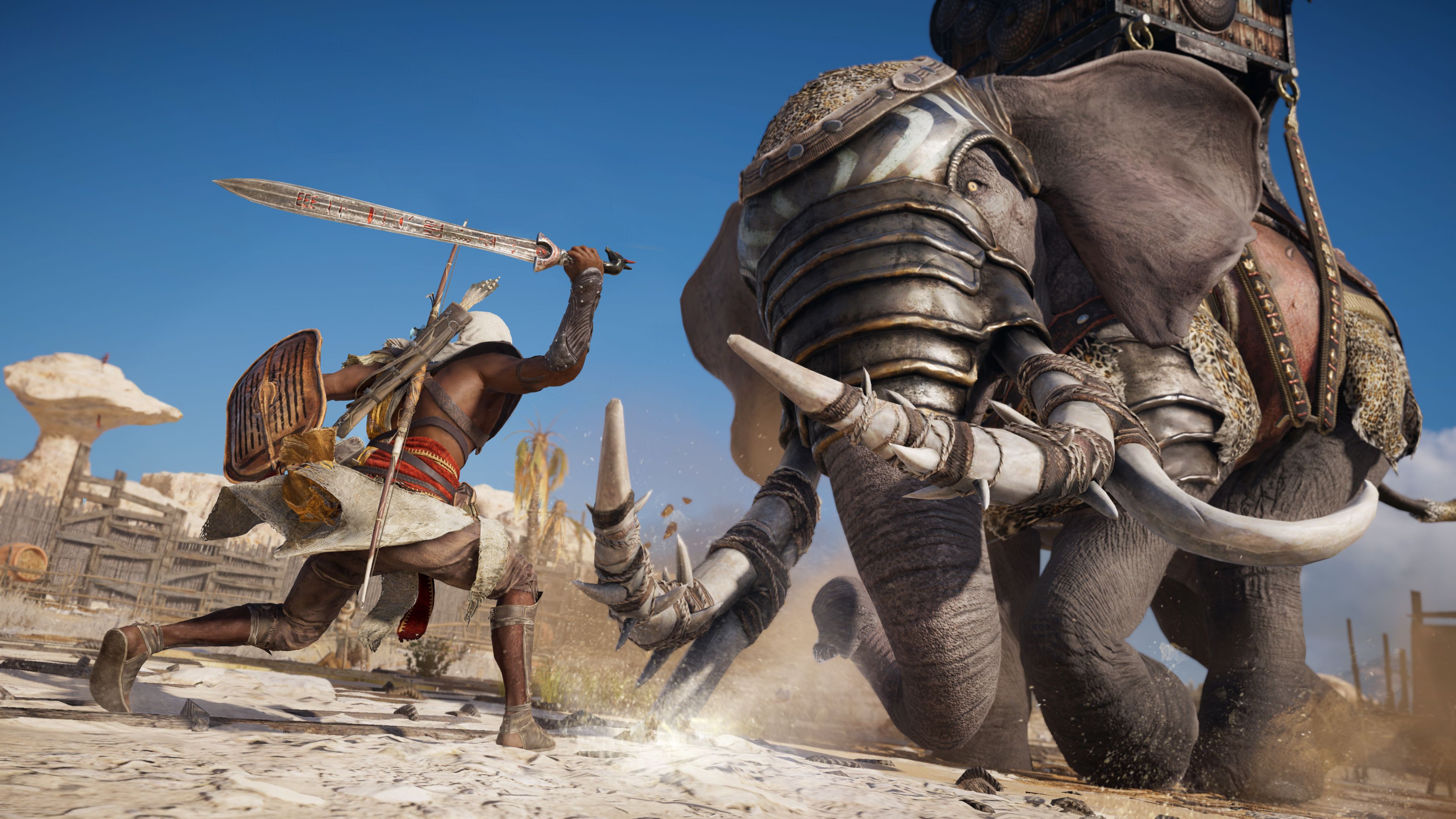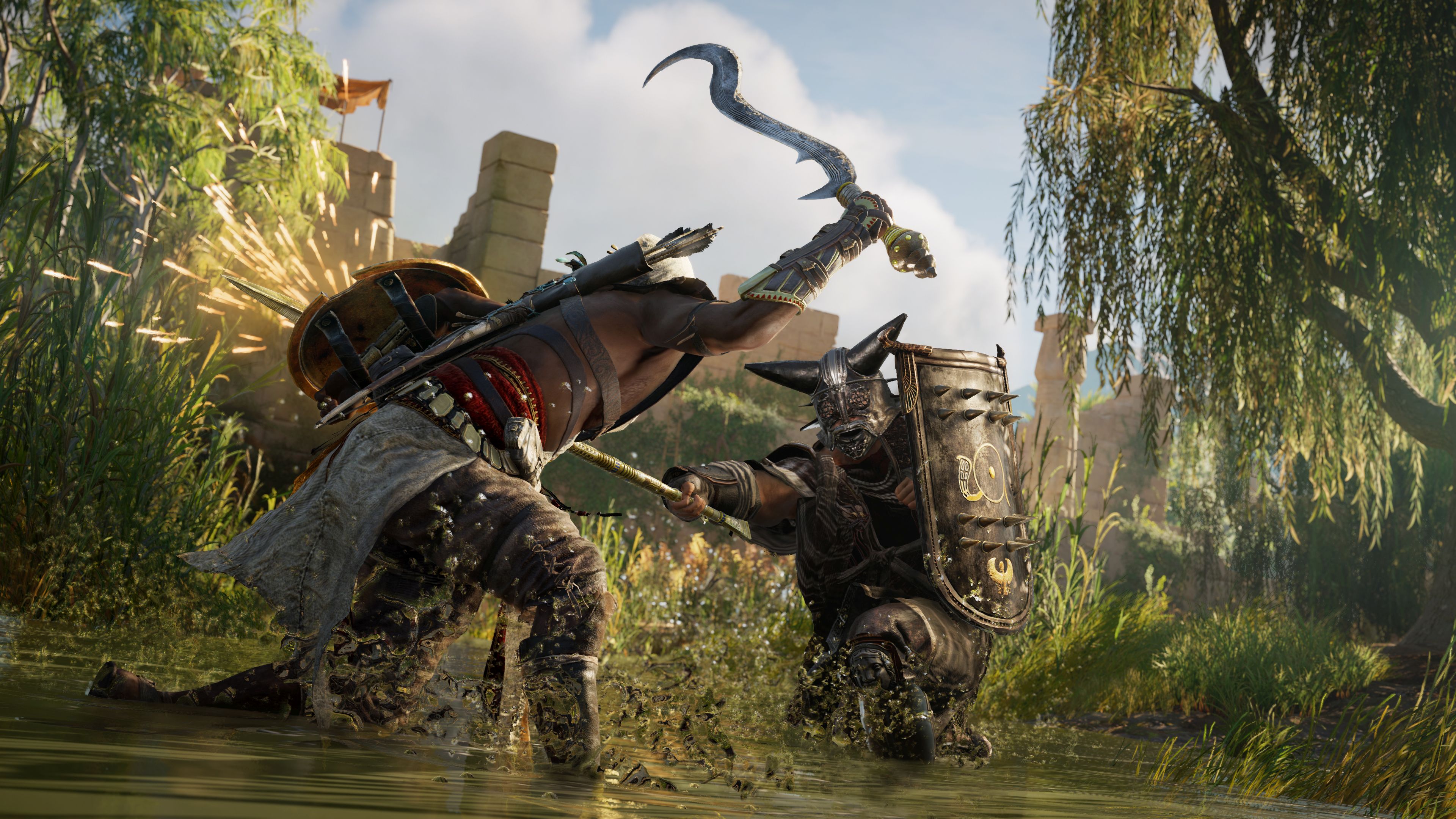For better or worse, Assassin's Creed: Origins is an RPG now
Levelling up in ancient Egypt.

I always hoped that Assassin's Creed would top the silliness of the 'air assassinate an ocelot' quest at the start of AC4. Assassin's Creed: Origins delivers early when I unleash an adrenaline attack on a hippo's face. In a storm of slashes I bring to bear the martial expertise of a master assassin to take down a swamp animal that, minutes earlier, had been quietly getting on with its day.
It is a high level hippo, though, so the barrage of blade strikes only removes a portion of its health bar and I'm forced to dodge around its teeth to lay into its blubbery flank. At this point a crocodile gets involved so I retreat to use my warrior's bow to blast the animals at range. It fires a spread of arrows like a shotgun. A flashing indicator on the hippo's health bar lets me know that head shots do extra damage.
Game system contrivances have always sat uneasily inside Assassin's Creed's beautiful, authentic worlds. I'm used to futuristic UIs floating in front of dusty snapshots of ancient life, but there is a lot more game in Assassin's Creed: Origins, and more friction between the setting and your moment-to-moment behaviour. We left Assassin's Creed as an action series, now it emerges from its two-year hibernation as an RPG in The Witcher 3 mould, complete with levelling, skill trees, an extensive loot system, and crafting.
These elements have appeared in Assassin's Creed games before, but the way Origins gates your progress, using your level and the quality of your gear, is a fundamental change. Missions have level recommendations, and if you strive too far ahead of your level you will barely be able to damage basic enemies. To move between story missions you need to grind out side quests and kill wildlife to gain crafting components and upgrade your gear.

I spent four hours or so in a northeastern section of Origins' enormous world. Even this fraction of land featured swamps, deserts, villages and temples. The setting is strong enough to compensate for the frequently dreary side quests, and often quite miserable tone. I recovered dead bodies from a swamp, followed an NPC back to her sacked village and murdered the bandits, and killed half a dozen tax collectors for extorting locals. If you preferred the frivolity of Ezio or Kenway, you won't find it here. Life is brutal in Assassin's Creed: Origins. Expect to spend a lot of time helping Egypt's downtrodden citizens.
If you preferred the frivolity of Ezio or Kenway, you won't find it here. Life is brutal in Assassin's Creed: Origins.
There's a good variety of activities, however, and the combat and levelling changes re-energise some of Assassin's Creed's familiar mission formats. Massed enemies at the same level as you actually pose a threat. I infiltrated a bandit camp with much greater caution than I normally would in an AC game, and made more use of the area's aerial routes and environmental hazards—I shot a barrel of oil placed near a brazier and brought a couple of guards to a nasty end.
Your weapon loadout matters a lot in Origins. In previous games weapons represented a suite of autoplay animations that would reward you for correctly pressing the counter button. Origins has moved away from this Arkham-esque combat system to dodge-and-strike system that forces you to account for your chosen weapon's range and speed. You lock on, circle, dodge through attacks, follow up with a few strikes and occasionally break enemy guard with powered-up strong strikes. Strikes charge your adrenaline bar, which you can expend to perform your weapon's special attack. This varies depending on what you have equipped, but tends to take the form of a big powerful attack or a frenzy mode that lets you pummel enemies really quickly.
The biggest gaming news, reviews and hardware deals
Keep up to date with the most important stories and the best deals, as picked by the PC Gamer team.
Combat takes some getting used to. Enemies happily swarm you instead of standing stupidly around you in a circle. Switching lock-ons to target the enemy you want to hit is fussy in a big fight. Also, while dodges are nice and snappy, striking isn't hugely satisfying, especially when you're whittling down the health bar of a stronger enemy. Glancing over the skill tree, I also worry whether combat will be fun from the outset, without access to slick multi-kill moves and overcharged adrenaline techniques.

It may not be as responsive as comparable systems in other games, but combat was such a non-event in older Assassin's Creed games—a prettily animated power trip with no real challenge. I think I prefer this imperfect system that makes enemies and gear matter. After a few hours I developed as suite of favourite weapons and gadgets that meaningfully changed the way I approached missions. The quick-fire bow is a lot of fun, and I felt very pleased with a sword I found in a dungeon at the end of one of the demo's better treasure hunting quests.
Killing hippos and helping peasants offers glimmers of fun, but I love Assassin's Creed when it feels like a historical action movie romp.
My favourite mission in the demo was a traditional assassination staged in a temple complex. Assassin's Creed's parkour traversal seems unchanged, and is as fun as it always was. The addition of a magic eagle that can tag enemies a great way to showcase the sprawling open world from on high, and the UI has been massively refined and decluttered. The sneaking, hiding and hidden blade kills are the same, but the streamlining around it improves your flow through the world. Your horse can even automatically navigate to your custom waypoints now so you can admire the passing scenery without having to dodge villagers.
The assassination reminded me that Assassin's Creed can stage memorable missions with interesting targets. My main worry for Origins—aside from questionable long-term appeal of its combat system in a game that feels like it's going to be absolutely enormous—is that the levelling requirements for missions will dilute the good stuff with busywork. Killing hippos and helping peasants offers glimmers of fun, but I love Assassin's Creed when it feels like a historical action movie romp that guest stars the most famous figures of the era. Helping morose peasants is a great fit for the fatalistic world of The Witcher, but until now Assassin's Creed has been a different breed of fantasy, and I wonder if the tone shift will wrongfoot long term fans.
The story does show promise. Playing as one half of a husband and wife team opens up new storytelling opportunities, and you will get to meet Cleopatra, Caesar and others in your journey around the Nile. Egypt is just gorgeous to explore, and I'll put up with a lot of animal-skinning to see the pyramids and the more built-up areas on the world map. The only other big question concerns optimisation on PC. The game was demoed on Xbox consoles, which gave me a good sense of how Origins plays. We'll have to wait for PC code to find out how it runs.
Assassin's Creed: Origins is out on October 27.
Part of the UK team, Tom was with PC Gamer at the very beginning of the website's launch—first as a news writer, and then as online editor until his departure in 2020. His specialties are strategy games, action RPGs, hack ‘n slash games, digital card games… basically anything that he can fit on a hard drive. His final boss form is Deckard Cain.


